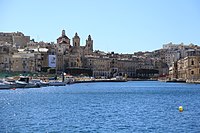This is a list of cities in Malta. By the usual standards that most other countries use when designating a city, Malta's cities would be too small to be considered such, and in fact Malta is sometimes regarded as a single city-state.[1] Malta's cities are regarded as such because they received the designation of città at some point during their history. In Maltese law, no distinction is made between cities, towns, and villages; city status is purely honorary and colloquial. Malta is divided into 68 local councils. The local councils which formerly had city status all feature a mural crown on the crest of their coat of arms. The table shows the historical cities:
| Within current local council |
Historical city | Year granted | Image | Population (2014)[2] |
Notes |
|---|---|---|---|---|---|
| Città Vittoriosa
(Victorious City) |
1530 | 
|
2,629 | Capital city from 1530 to 1571, and one of the Three Cities. City status confirmed following the Great Siege of Malta in 1565.[3] | |
| Città Cospicua
(Conspicuous City) |
1722 | 
|
5,395 | One of the Three Cities. City status granted in 1722 by Grand Master Marc'Antonio Zondadari.[4] | |
| Città Notabile
(Notable City) |

|
292 | Capital city from antiquity to 1530. | ||
| Città Pinto
(Pinto's City) |
1743 | 
|
16,779 | City status granted on 25 May 1743 by Grand Master Manuel Pinto da Fonseca, following a request made by Don Giuseppe Vella.[5] | |
| Città Victoria
(Victoria's City) |
1887 | 
|
6,901 | Capital city of Gozo. City status granted on 10 June 1887 by Queen Victoria, following a petition made by Bishop Pietro Pace and Chief Justice Adrian Dingli on occasion of Victoria's Golden Jubilee.[6] | |
| Città Invicta
(Invincible City) |
1565 | 
|
2,784 | One of the Three Cities. City status granted following the Great Siege of Malta in 1565.[7] | |
| Città Ferdinand
(Ferdinand's City) |
1797 | 
|
8,367 | City status granted on 30 December 1797 by Grand Master Ferdinand von Hompesch zu Bolheim, following a petition made by Don Salvatore Corso and the inhabitants.[8] | |
| Città Umilissima
(Humblest City) |
1571 | 
|
6,444 | Capital city since 18 March 1571.[9] | |
| Città Hompesch
(Hompesch's City) |
1797 | 
|
15,404 | City status granted on 14 September 1797 by Grand Master Ferdinand von Hompesch zu Bolheim, following a request made by Don Carlo Caruana and the inhabitants. In 1801, the Hompesch Gate was built to commemorate this event.[8] | |
| Città Rohan
(Rohan's City) |
1777 | 
|
11,903 | City status granted on 21 June 1777 by Grand Master Emmanuel de Rohan-Polduc, following a petition made by the inhabitants. In 1798, the De Rohan Arch was built to commemorate this event.[10] | |
| Città Beland
(Beland's City) |
1797 | 
|
11,508 | City status granted on 30 December 1797 by Grand Master Ferdinand von Hompesch zu Bolheim, following a petition made by Don Giacomo Michele Tortella and the locals.[8] He named it after his mother's maiden name. |
- ^ "Flags, Symbols and their uses". gov.mt. Government of Malta. Archived from the original on 29 June 2015.
- ^ "Estimated Population by Locality 31st March, 2014". Government of Malta. 16 May 2014. Archived from the original on 21 June 2015.
- ^ Guillaumier, Alfie (1987). Bliet u Rħula Maltin (in Maltese). Valletta: Valletta Publishing & Promotion Co. Ltd. p. 41.
- ^ "Bormla (Città Cospicua)". lc.gov.mt. Archived from the original on 31 October 2015.
- ^ Zammit, Vincent (1992). Il-Gran Mastri - Ġabra ta' Tagħrif dwar l-Istorja ta' Malta fi Żmienhom - It-Tieni Volum 1680–1798 (in Maltese). Valletta: Valletta Publishing & Promotion Co. Ltd. pp. 427–428.
- ^ "The Conferment of The Title of City". Victoria Local Council. Archived from the original on 8 July 2015.
- ^ Guillaumier (1987), p. 324
- ^ a b c Zammit (1992), pp. 513–516
- ^ Gaul, Simon (2007). Malta, Gozo & Comino. New Holland Publishers. p. 100. ISBN 9781860113659.
- ^ "The De Rohan Arch". Haz-Zebbug.com. Archived from the original on 31 October 2015.